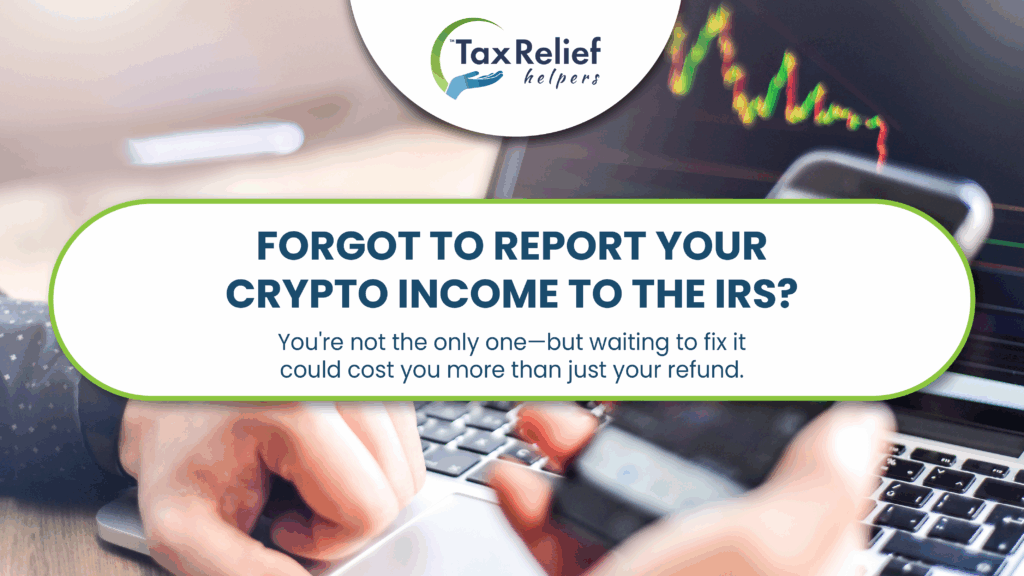Cryptocurrency has gone from a fringe interest to a mainstream financial asset, but with that rise comes IRS scrutiny. If you forgot to report your crypto income on your tax return, you’re not alone. With the complexities of wallets, exchanges, NFTs, and staking rewards, it’s easy to overlook taxable events.
The good news? There are steps you can take right now to correct your return, minimize penalties, and get back on solid ground with the IRS.
Why Reporting Crypto Income Matters
The IRS classifies cryptocurrency as property, not currency. This means every time you sell, trade, or use crypto, it could trigger a taxable event. Even converting one crypto to another or earning crypto through staking can be considered income.
What are the Potential Consequences of Failing to Report
Forgetting to report your crypto income can lead to:
- IRS penalties and interest
- Accuracy-related fines (up to 20%)
- Audits or criminal investigations for willful neglect
- Stress, time loss, and financial burden
How the IRS Tracks Crypto Transactions
Think your crypto activity is invisible? Think again. The IRS receives 1099 forms from major exchanges and uses blockchain analytics tools to trace transactions. If there’s a discrepancy between what you reported and what they see, they may send a notice.
The IRS’s Operation Hidden Treasure focuses specifically on unreported crypto income.
Common Reasons People Miss Reporting Crypto
Didn’t Know Trading or Staking Was Taxable
Many new investors assume that taxes only apply when converting crypto to USD. In reality, trading one token for another or earning staking rewards are also taxable events.
Used Multiple Wallets or Exchanges
Crypto users often move funds across wallets, DeFi protocols, and exchanges. Without a unified report, it’s easy to lose track of taxable activity.
Thought Crypto Was Anonymous or Untraceable
While crypto offers some privacy, it is not immune to detection. Blockchain records are permanent and publicly visible, and the IRS is equipped to analyze them.
What To Do If You Forgot to Report Crypto Income
First, don’t panic. Tax mistakes are common, and the IRS allows you to amend returns. Acting proactively is your best defense.
Compile data from:
- All exchanges (Coinbase, Binance, Kraken, etc.)
- Wallets (hardware and digital)
- DeFi protocols and NFT platforms
- Crypto received as payment or staking rewards
And then, Calculate the Gains or Losses
You’ll need to determine your cost basis and fair market value at the time of each transaction. Crypto tax software like Koinly, CoinTracker, or ZenLedger can help. If you realize losses, you might even reduce your overall tax bill.
How to Amend Your Tax Return
Use Form 1040-X
If the return in question has already been filed, you’ll need to submit Form 1040-X (Amended U.S. Individual Income Tax Return).
Correct Any Missed Income
Add the unreported crypto income to the correct section of your return:
- Schedule 1 for ordinary income (staking, mining)
- Form 8949 for capital gains or losses
- Schedule D to summarize your capital gains
Include New Crypto Activity in Your Calculations
Recalculate your total taxable income and submit the corrected forms. Attach explanations and documentation as needed.
Will You Face Penalties or Interest?
If your underreporting results in a tax due, the IRS may charge:
- Late payment penalties: 0.5% per month
- Interest: Compounded daily
- Accuracy-related penalties: 20% of underpaid tax
What Factors Reduce Penalty Risk?
You’re less likely to face harsh consequences if:
- You correct the error before receiving an IRS notice
- You made a good-faith effort to comply
- This is your first offense
The IRS often treats voluntary amendments more leniently than discovered omissions.
When to Contact a Tax Professional
Crypto tax laws are evolving, and your situation may be more complex than it seems. A crypto-savvy tax expert can help you:
- Identify reportable transactions
- Navigate IRS correspondence or audits
- Maximize your legal deductions
What Complex Transactions Require Help?
Consider professional help if your case includes:
- Yield farming or staking rewards
- NFT creation and sales
- DeFi loans or wrapped assets
- DAO income or governance token rewards
You can find expert assistance on our blog.
Prevent Future Reporting Mistakes
Track Transactions Year-Round
Don’t wait until tax season. Keep monthly records and update your transaction log regularly.
Stay Updated on IRS Guidance
IRS regulations change frequently. Stay informed by following credible tax resources or subscribing to our blog.
Consult a Tax Advisor Annually
As crypto evolves, so should your tax strategy. An annual check-in with a tax advisor ensures ongoing compliance and optimization.
Final Thoughts
Forgetting to report your crypto income isn’t the end of the world, but it’s a mistake that needs fixing. The sooner you act, the better your chances of minimizing penalties and staying in good standing with the IRS.
By understanding your obligations, keeping detailed records, and seeking professional help when needed, you can take control of your crypto tax situation with confidence.Need help fixing your crypto taxes? Connect with a qualified crypto tax professional by visiting our blog.
Written by: Thomas Brooks
Published: September 29, 2025
